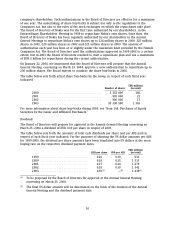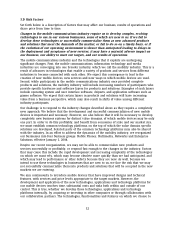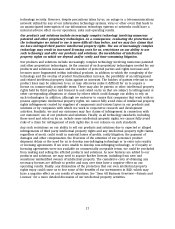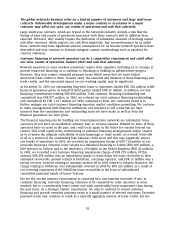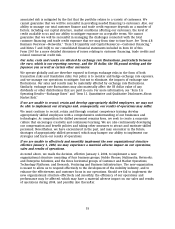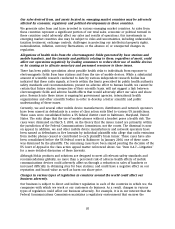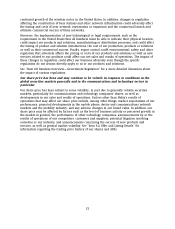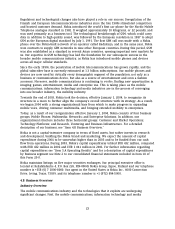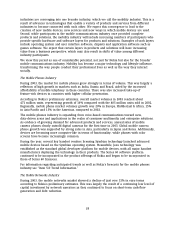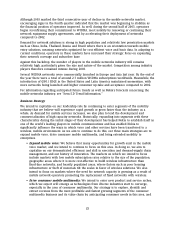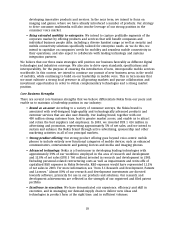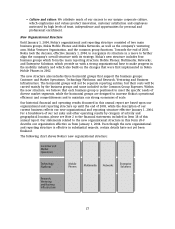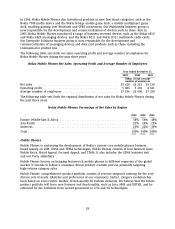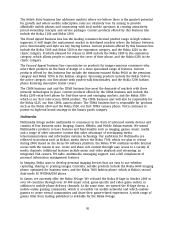Nokia 2003 Annual Report Download - page 21
Download and view the complete annual report
Please find page 21 of the 2003 Nokia annual report below. You can navigate through the pages in the report by either clicking on the pages listed below, or by using the keyword search tool below to find specific information within the annual report.Our sales derived from, and assets located in, emerging market countries may be adversely
affected by economic, regulatory and political developments in those countries.
We generate sales from and have invested in various emerging market countries. As sales from
these countries represent a significant portion of our total sales, economic or political turmoil in
these countries could adversely affect our sales and results of operations. Our investments in
emerging market countries also may be subject to risks and uncertainties, including unfavorable
taxation treatment, exchange controls, challenges in protecting our intellectual property rights,
nationalization, inflation, currency fluctuations, or the absence of, or unexpected changes in,
regulation.
Allegations of health risks from the electromagnetic fields generated by base stations and
mobile handsets, and the lawsuits and publicity relating to them, regardless of merit, could
affect our operations negatively by leading consumers to reduce their use of mobile devices
or by causing us to allocate monetary and personnel resources to these issues.
There has been public speculation about possible health risks to individuals from exposure to
electromagnetic fields from base stations and from the use of mobile devices. While a substantial
amount of scientific research conducted to date by various independent research bodies has
indicated that these radio signals, at levels within the limits prescribed by public health authority
safety standards and recommendations, present no adverse effect to human health, we cannot be
certain that future studies, irrespective of their scientific basis, will not suggest a link between
electromagnetic fields and adverse health effects that would adversely affect our sales and share
price. Research into these issues is ongoing by government agencies, international health
organizations and other scientific bodies in order to develop a better scientific and public
understanding of these issues.
Currently, we and several other mobile device manufacturers, distributors and network operators
have been named as defendants in a series of class action suits filed to various US jurisdictions.
These cases were consolidated before a US federal district court in Baltimore, Maryland, United
States. The suits allege that the use of mobile phones without a headset poses a health risk. The
cases were dismissed on March 5, 2003, on the theory that the issues raised are primarily within
the jurisdiction of the Federal Communications Commission, not the courts. The dismissal is now
on appeal. In addition, we and other mobile device manufacturers and network operators have
been named as defendants in five lawsuits by individual plaintiffs who allege that radio emissions
from mobile phones caused or contributed to each plaintiff’s brain tumor. Those cases have also
been consolidated before the US federal court in Baltimore. In January 2004, one of these cases
was dismissed by the plaintiffs. The remaining cases have been stayed pending the decision of the
US Court of Appeal in the class action appeal matter referenced above. See ‘‘Item 8.A.7—Litigation’’
for a more detailed discussion of these lawsuits.
Although Nokia products and solutions are designed to meet all relevant safety standards and
recommendations globally, no more than a perceived risk of adverse health effects of mobile
communications devices could adversely affect us through a reduction in sales of handsets or
increased difficulty in obtaining sites for base stations, and could have a negative effect on our
reputation and brand value as well as harm our share price.
Changes in various types of regulation in countries around the world could affect our
business adversely.
Our business is subject to direct and indirect regulation in each of the countries in which we, the
companies with which we work or our customers do business. As a result, changes in various
types of regulation could affect our business adversely. For example, it is in our interest that the
Federal Communications Commission maintains a regulatory environment that ensures the
20


